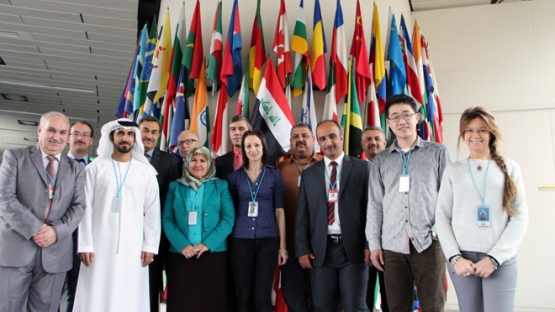Best practice environmental management demands a high degree of confidence in the data and information developed by analytical laboratories. In this context, a training workshop on quality assurance requirements for environmental radioanalytical laboratories took place last week at IAEA headquarters in Vienna, organized by the IAEA Environment Laboratories, under IAEA technical cooperation projects IRQ0006, JOR9010 and UAE7003. Ten participants from Iraq, Jordan and the United Arab Emirates participated. Scientists currently hosted at the IAEA laboratories on fellowships or internships related to quality assurance also attended the training workshop.
"The natural environment and our impact on it is extremely complex, and understanding radioactivity in the environment is a key component of good environmental management. More and more Member States are recognizing the need for a systematic approach to improving and harmonizing methodologies for the determination and monitoring of radioactivity in the environment," said Mr David Osborn, Director of the IAEA Environment Laboratories. "The lack of specific guidelines and technical documents for quality assurance in radioanalytical techniques - for example, quality control procedures, or instrument calibration - contributes to unreliability and incomparability in measurement results. To start filling this gap, this training workshop is facilitating the sharing of knowledge, contributing to better quality in radioanalytical measurement results, and promoting the use of standardized quality assurance procedures in radioanalytical techniques."
Participants were provided with lectures, practical exercises and round-table discussions covering the topics related to compliance with the ISO 17025 quality assurance requirements applied for environmental radioanalytical laboratories. ISO 17025 is an international standard, which specifies the general requirements for the competence to carry out tests and/or calibrations, including sampling. It covers testing and calibration performed using standard methods, non-standard methods, and laboratory-developed methods.
In a first session, lectures were given on the management and technical requirements of a quality system in accordance with ISO 17025. A second session was dedicated to the implementation of the quality system. This session covered areas such as measurement traceability, method validation and use of reference materials. The third session was devoted to the application of such a quality system to the gamma-ray spectrometry radioanalytical technique. This session included practical exercises on quality control charts and measurement uncertainty estimation applied to gamma-ray spectrometry. A final round-table discussion gave participants the opportunity to reflect on the implementation of a quality system in their own laboratories.
"This training workshop is a resource- and cost-effective tool to successfully respond to the common needs of several Member States from the Asia and the Pacific region", explained Mr Ali Boussaha, Director of the Division for Asia and the Pacific in the Department of Technical Cooperation. "Thanks to this training workshop, the participants are now better prepared to establish a quality assurance and quality control programme in their respective nuclear analytical laboratories."
The training course included a half-day technical visit to the IAEA laboratories, which gave the participants an opportunity to learn about how nuclear technology can be applied in a range of different fields, including food, health and the environment.
The training workshop has strengthened quality in analytical measurements in the participating Member States and has resulted in the dissemination of specific guidelines for quality assurance implementation and harmonization amongst the participating bodies.
Raising the Bar - Supporting Quality Assurance Programmes in Nuclear Analytical Laboratories
10 Apr 2014
Related resources
More
Last update: 05 Jun 2020


